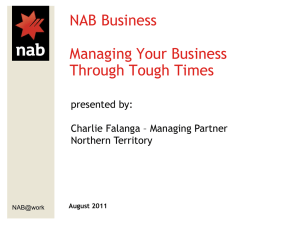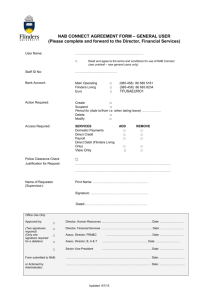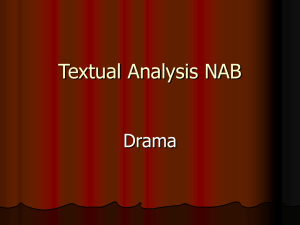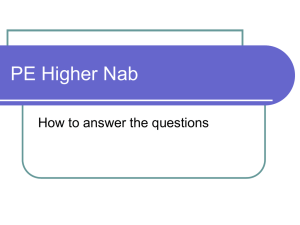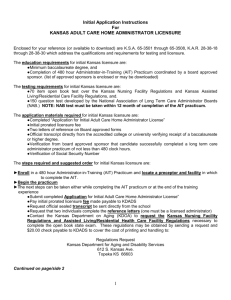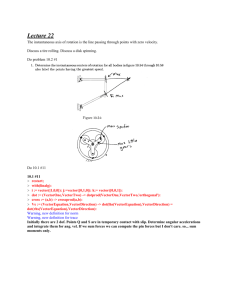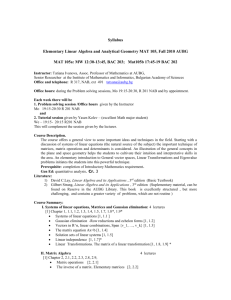bank bills
advertisement
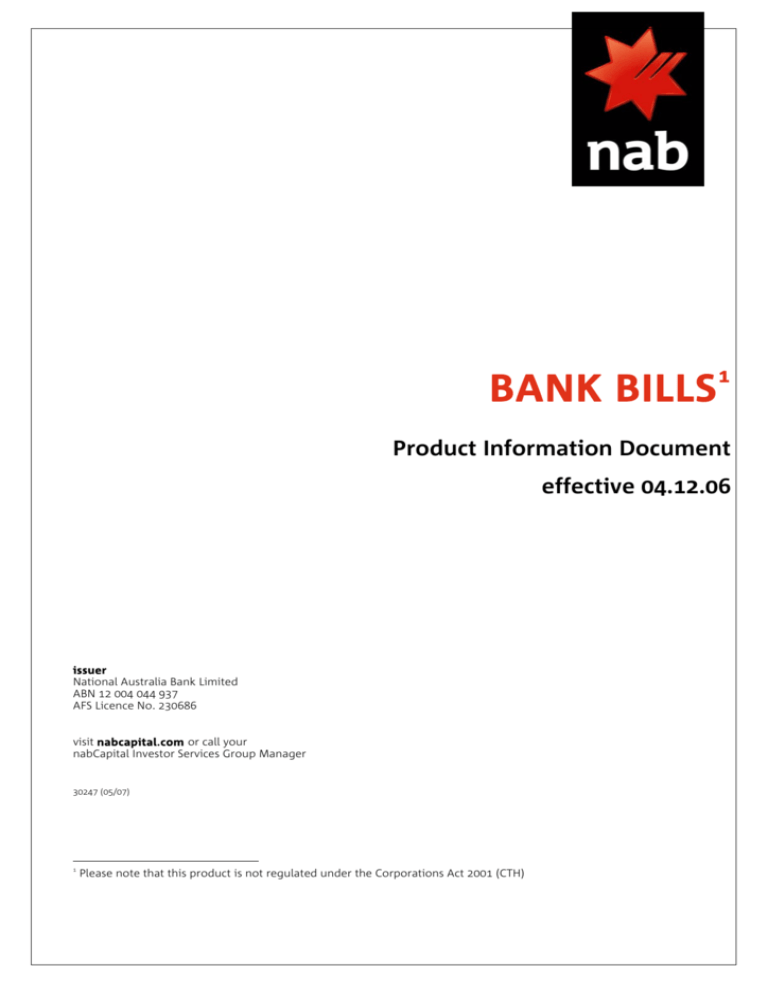
BANK BILLS 1 Product Information Document effective 04.12.06 issuer National Australia Bank Limited ABN 12 004 044 937 AFS Licence No. 230686 visit nabcapital.com or call your nabCapital Investor Services Group Manager 30247 (05/07) 1 Please note that this product is not regulated under the Corporations Act 2001 (CTH) Table of Contents Product Information Document ............................................................................................ 3 Updating Information ........................................................................................................... 3 How can I get more Information?......................................................................................... 3 Key Features of Bank Bills .................................................................................................... 3 Availability of Bank Bills ....................................................................................................... 4 Purchasing Bank Bills ........................................................................................................... 4 Specifying the purchase price ....................................................................................4 Illustration of how the face value of a Bank Bill is calculated...........................................4 Specifying the face value ..........................................................................................5 Illustration of the calculation of the purchase price of a Bank Bill ....................................5 Settlement of your Bank Bills ............................................................................................... 5 Setting of interest rates........................................................................................................ 6 Confirmations ....................................................................................................................... 6 Repurchase of Bank Bills by NAB .......................................................................................... 6 Illustration of how the repurchase price is calculated.....................................................7 Significant features, benefits and risks................................................................................. 7 Features and benefits of a Bank Bill include: ................................................................7 Risks ..............................................................................................................8 Fees and other costs............................................................................................................. 8 Are there any commissions payable to staff members of NAB?............................................. 8 Significant Taxation Implications ......................................................................................... 9 Using the NAB Connect Channel to purchase Bank Bills ........................................................ 9 What do I do if I have a problem or dispute relating to my Bank Bills? ................................ 9 Code of Banking Practice ...................................................................................................... 9 Privacy Policy ..................................................................................................................... 10 Meaning of Words ............................................................................................................... 10 Product Information Document This Product Information Document ("PID") sets out important information about NAB's Bank Accepted Bill Investment product ("Bank Bill"). By using this PID you will be able to understand: • the key features of a Bank Bill; and • the significant benefits and risks associated with a Bank Bill. Make sure you read this PID thoroughly before making a decision to acquire a Bank Bill. Any advice in this PID has been prepared without taking account of your objectives, financial situation or needs. Before acting on any advice in this PID, NAB recommends that you consider whether it is appropriate for your circumstances. Some of the words in this document have a special meaning and they are defined in the "Meaning of Words" section at the end of this document. Where they appear in this PID, the defined terms are in bold. Updating Information Information in this PID may change from time to time and may be out of date at the time the PID is given to you. Where the updated information does not include materially adverse information, a notice containing the updated information will be available through: • contacting NAB on 1800 193 681 • visiting NAB at www.nabcapital.com • A paper copy of any updated information may be obtained without charge upon request. After the product is issued, you will be notified of any material change to, or significant event affecting the information in this PID. Changes will be notified by email or in writing. How can I get more Information? You can get more information about NAB's Bank Bills by calling NAB on 1800 193 681 or visiting www.nabcapital.com or any branch. Hearing impaired customers with telephone typewriters can contact us on 1300 363 647. Key Features of Bank Bills A Bank Bill is a short-term investment in a security, being a bill of exchange, that has been accepted by NAB. By accepting the bill of exchange, NAB has made itself liable to pay the face value of the bill to the customer on the date specified in the Bank Bill (the maturity date). If you choose to invest in a Bank Bill, you pay the purchase price on the purchase date. On the maturity date, NAB pays you the face value of the Bank Bill. The return on your investment is equal to the difference between the purchase price and the face value. 3 Availability of Bank Bills NAB typically offers its Bank Bills in conjunction with its Negotiable Certificates of Deposit product. NAB will not usually sell you a Bank Bill unless the overall value of your transaction (taking into account any Negotiable Certificates of Deposit also purchased as part of the same transaction) is $100,000 or more. However, NAB may, in its discretion, consider transactions with a lower value from time to time. Generally, if a Bank Bill with a face value of the amount you require is not available, NAB will provide you with a Negotiable Certificate of Deposit to make up the difference between the value of the available Bank Bill and the amount you require. For more information on Negotiable Certificate of Deposit see NAB's Product Disclosure Statement for Negotiable Certificate of Deposit. The terms of the Bank Bills offered by NAB are typically between 30 and 185 days. However, NAB may, in its discretion, consider requests for a shorter or longer term on a case-by-case basis. Purchasing Bank Bills If you wish to purchase a Bank Bill, you will need to consider whether you: • wish to invest a particular amount of money on the purchase date; or • want a particular amount of money to be paid to you on a particular date in the future (for example, to manage your cash flow). If you want to invest a particular amount of money, then you will agree with NAB the purchase price, term and rate of return (interest rate) of the Bank Bill you want. If you want a set sum of money to be paid to you on a particular date in the future, you will agree with NAB the face value, term and rate of return (interest rate) of the Bank Bill you want. Looking at each alternative in turn: Specifying the purchase price If you wish to invest a particular sum of money, you and NAB will agree upon the purchase price, term and rate of return (interest rate) applying to your Bank Bill. Once that is agreed, NAB then calculates the face value of your Bank Bill by applying the interest rate to your proposed initial investment (the purchase price) taking into account the term. The face value is calculated as follows: face value = purchase price × (1 + (daily interest rate × term )) where: - the daily interest rate is equal to the annual interest rate divided by 365; and - the term is expressed in days Illustration of how the face value of a Bank Bill is calculated∗ You want to invest $200,000 for 90 days. As a result, you request a Bank Bill with a purchase price of $200,000 and a term of 90 days. You agree an annual interest rate of 5.00% per annum with NAB. The face value of your Bank Bill is calculated as follows: ⎛ ⎛ 5.00% ⎞⎞ face value = $200,000 × ⎜⎜1 + ⎜ × 90 ⎟ ⎟⎟ = $202,465.75 ⎠⎠ ⎝ ⎝ 365 ∗ This is an example only for information purposes and may not reflect your actual investment. 4 In this case, you pay a purchase price of $200,000 on the purchase date for which you receive a Bank Bill with a face value of $202,465.75. The return which you will receive on your investment is $2,465.75 (i.e. the difference between the purchase price of $200,000 and the face value of $202,465.75 paid to you by NAB on the maturity date). Specifying the face value If you want a particular sum to be available on a date in the future, you and NAB will agree upon a face value, term and rate of return (interest rate) to apply to your Bank Bill. Once that is done, NAB then calculates the purchase price of your Bank Bill by discounting the face value taking into account the agreed interest rate and term of your Bank Bill. The purchase price is calculated as follows: purchase price = face value 1 + (daily interest rate × term) where: - the daily interest rate is equal to the annual interest rate divided by 365; and - the term is expressed in days. Illustration of the calculation of the purchase price of a Bank Bill∗ You want to purchase a Bank Bill with a face value of $100,000 for a term of 120 days. You and NAB agree that an interest rate of 5.00% per annum will apply to your Bank Bill. Your purchase price is calculated as follows: purchase price = $100,000 = $98,382.75 ⎛ 5.00% ⎞ 1+ ⎜ × 120 ⎟ ⎝ 365 ⎠ The purchase price which you pay on the purchase date for the Bank Bill with a face value of $100,000 maturing in 120 days is $98,382.75. The return which you will receive on your investment is $1,617.25 (i.e. the difference between purchase price of $98,382.75 and the face value of $100,000). Settlement of your Bank Bills In either case, you must pay us the purchase price on the purchase date. This is done by way of a direct transfer from your funding account. You must ensure there are sufficient cleared funds in your funding account in order to meet the purchase price. In the event that there are not sufficient funds in your account to meet the purchase price, the transaction will not be completed and you will be responsible for any fees or charges incurred as a result of the lack of funds in the funding account. NAB will hold the Bank Bills on your behalf, free of charge, until the maturity date. On the maturity date, NAB pays the face value to you by direct transfer to your funding account. ∗ This is an example only for information purposes and may not reflect your actual investment. 5 Setting of interest rates As noted above, an interest rate is used to calculate the purchase price or face value of your Bank Bill, depending on the nature of your requirements. Interest rates for bank bills are quoted in the wholesale market and fluctuate according to matters such as the Reserve Bank of Australia cash rate, wholesale market view on the outlook for the cash rate, changes in credit ratings for individual issuers and wholesale market demand and supply dynamics. Any adjustment to these interest rates by NAB takes into account the following factors: • current market conditions; • costs incurred by NAB in providing the product; • the size and term of your investment; • risks, if any, associated with the product; • NAB’s profit margin; and • your overall relationship with NAB. Details of current interest rates are available on request. Confirmations Shortly after the purchase date, NAB will send you confirmation of your investment, including details of the purchase price, face value and term, by email or fax. You may wish to keep this confirmation for tax purposes. NAB will not provide any further record or statement of account in relation to your investment. For users of NAB Connect Channel, confirmation of your purchase will be in accordance with this paragraph and the paragraph entitled “Using the NAB Connect Channel to purchase Bank Bills” below. Repurchase of Bank Bills by NAB You may ask NAB to repurchase a Bank Bill. A Bank Bill is a negotiable instrument. It is entirely at NAB’s discretion whether it agrees to repurchase a Bank Bill. The repurchase price you obtain on resale may be less than the purchase price. Even if the repurchase price is greater than the purchase price, the rate of return on your investment may be less than the rate of return contemplated when you purchased the Bank Bill. For these reasons it is important that you properly consider the appropriateness of the term of the Bank Bill on purchase date to minimise the likelihood that you may have to ask NAB to repurchase the Bank Bill prior to the maturity date. NAB has complete discretion in deciding whether it will agree to a request for a repurchase. Generally speaking, NAB will only agree to a repurchase if the face value that is being repurchased amounts to at least $100,000. However, NAB may, in its discretion, consider repurchasing an amount less than $100,000. The price that NAB will pay to you for the repurchase of part or all of your Bank Bill investment is calculated using the same method used to calculate a purchase price where a customer wants a Bank Bill with a specific face value. In particular, the repurchase price is calculated as follows: repurchase price = where: 6 amount being repurchase d 1 + (daily interest rate x term ) - the daily interest rate is equal to the annual interest rate divided by 365; and - the term is expressed in days. The interest rate used to determine the price is based on wholesale market interest rates which may fluctuate due to the factors previously outlined in “Setting of interest rates”. Any adjustment made by NAB to wholesale market interest rates is determined by reference to the factors previously described in “Setting of interest rates”. Illustration of how the repurchase price is calculated* Consider the example given above, where a customer purchased a Bank Bill with a face value of $100,000 for a purchase price of $98,382.75, based on an interest rate of 5.00% per annum. With 40 days remaining until the maturity date the customer decides it wishes to sell the entire investment back to NAB. NAB agrees to repurchase the Bank Bill. However, by that time, market conditions have changed and NAB offers to repurchase the Bank Bill at a repurchase interest rate of 5.20% per annum. The customer agrees to that rate. The repurchase price is calculated as follows: $100,000 = $99,433.37 ⎛ 5.20% × 40 ⎞ ⎟⎟ 1 + ⎜⎜ ⎝ 365 ⎠ In this case, NAB buys the Bank Bill back from the customer for $99,433.37. This means that the customer's return on the investment was $1,050.62 (i.e. $99,433.37 minus $98,382.75). In the above example the customer has earned $1,050.62 on the $98,382.75 investment over 80 days. This equates to a rate of return of approximately 4.87% per annum for the period the Bank Bill was held. The anticipated rate of return rate on the purchase date was in fact 5.00% per annum. If the expected rate of return of 5.00% per annum was earned, then the amount of interest earned would have been $1,078.17. Although in this example the return on the investment is still positive, the return could be negative (that is, the repurchase price could be lower than the purchase price) depending on interest rate movements, changes in the factors taken into account by NAB when determining the repurchase interest rate and the number of days the Bank Bill was held for. As set out above, the rate of return achieved on the investment may well be lower than that anticipated at the time the customer purchased the Bank Bill. If you and NAB agree to a repurchase, NAB will pay you the repurchase price by direct transfer to your funding account and send you an email or facsimile confirming the details of the repurchase shortly after that transaction takes place. Significant features, benefits and risks Features and benefits of a Bank Bill include: • The interest rate is fixed for the term of the investment, which means your money is protected against falling interest rates for the term of the investment; • Flexible terms are available, ranging from 30 days to 185 days; • There are no transaction or account-keeping fees, although fees and charges may apply to your funding account in respect of transfers made to or from that account (these fees and charges should be set out in the PDS for your funding account); * This example is for illustrative purposes only. 7 • Your Bank Bill will be held on your behalf by NAB free of charge. • A Bank Bill is a negotiable instrument and is therefore capable of being sold prior to the maturity date (but see below for some of the risks that are associated with repurchase of Bank Bills). Risks Significant risks of a Bank Bill include the following: • You will be taking the market risk on the transaction (the risk that movements in interest rates adversely affect your investment). The return on your Bank Bill is fixed, so if interest rates increase during the term you will not obtain any benefit from that increase. NAB recommends you monitor relevant interest rate movements when investing in a Bank Bill and notes that its activities on its own account in interest rate markets may influence interest rates. • It is entirely at NAB’s discretion whether it agrees to repurchase a Bank Bill and the repurchase price you obtain on resale may be less than the purchase price. Even if the repurchase price is greater than the purchase price, the rate of return on your investment may be less than the rate of return contemplated when you purchased the Bank Bill. • As with many investment products, you will also be reliant upon the ability of the counterparty, in this case, NAB's ability, to meet its obligations, namely to pay you the face value of the Bank Bill on the maturity date. To reduce the risk of this not occurring, some financial institutions, including NAB, are prudentially regulated by the Australian Prudential Regulation Authority. We recommend you seek independent financial advice before deciding whether to acquire a Bank Bill. In particular, advice should be sought as to: • the suitability of a Bank Bill in your particular circumstances; and • appropriate risk management strategies. Risks and the monitoring of risks are your responsibility. Fees and other costs NAB does not charge you any Bank fees or charges for this product. Separate fees may be payable in relation to your funding account and services associated with that funding account. These fees will be set out in the relevant documents in relation to your funding account and the services associated with that funding account (for example, the relevant Product Disclosure Statement, terms and conditions or fees and charges document). Additionally, depending on what State or Territory you are in, your investment in the Bank Bill may be subject to Government taxes and duties. Are there any commissions payable to staff members of NAB? Staff members with whom you will deal in relation to the Bank Bills are salaried employees of NAB and do not receive any proportion of any fees or commissions paid to NAB in connection with the products detailed in this PID. Staff members may be entitled to receive additional monetary or non-monetary benefits and/or rewards resulting from participation in programs conducted by NAB. Monetary benefits or rewards may include an annual bonus, the level of which may depend on the overall performance of NAB group of companies. Non-monetary benefits or rewards for staff members and their partners may include gift vouchers, film tickets, restaurant meals, attendance at an annual conference or other functions. Whether staff members receive any such benefits and rewards depend on a number of performance-related factors, including the level of remuneration generated for NAB from sales of products as a consequence of the staff member's advice. 8 It is not possible to determine at any given time whether a staff member will receive such benefits or rewards or to quantify them. They are generally not directly attributable to any particular product, facility or service that the staff member has given advice on. Significant Taxation Implications The information in this section is general information only. NAB recommends that you seek independent tax advice regarding the consequences of acquiring, holding or disposing of Bank Bills, to take into account your personal circumstances. The return on your Bank Bill may form part of your assessable income for taxation purposes. If you are a non-resident of Australia, NAB may be obliged by law to deduct Pay as You Go Withholding Tax from the return on your investment. Using the NAB Connect Channel to purchase Bank Bills In NAB Connect Bank Bills are also referred to as Investment Bills. You can use the NAB Connect Channel to purchase Bank Bills. You can do that in accordance with the process described in the NAB Connect user guide. Your purchase will be complete only when NAB makes a trade ticket with a contract reference number available on the NAB Connect server for your internet browser to collect and present on your computer. Please note that in some cases where you have searched for Bank Bills and specified a face value for the purchase and there are insufficient or no Bank Bills which satisfy those search criteria, the investment application software will automatically generate Negotiable Certificates of Deposit to meet the face value you have specified. For more information on the operation and use of the NAB Connect Channel, see the NAB Connect Channel Terms and Conditions. What do I do if I have a problem or dispute relating to my Bank Bills? NAB has an internal dispute resolution process. For information about resolving problems or disputes, contact NAB on 1800 152 015 or ask at any branch of NAB. If you subsequently feel that an issue has not been resolved to your satisfaction, you may be able to raise your concerns with the Banking and Financial Services Ombudsman, if you are an individual or small business customer covered by the Banking and Financial Services Ombudsman Scheme. Code of Banking Practice NAB has adopted the Code of Banking Practice and relevant provisions of the Code apply to these products, if you are an individual or a small business customer (as defined by the Code). You can obtain from NAB upon request: (a) information on NAB's current interest rates and standard fees and charges relating to these products, if any; (b) general descriptive information concerning NAB's banking services including: 9 (i) for accounts with cheque access, general descriptive information about cheques; (ii) account opening procedures; (c) (d) (iii) NAB's obligations regarding the confidentiality of your information; (iv) compliant handling procedures; (v) bank cheques; (vi) the advisability of you informing NAB promptly when you are in financial difficulty; (vii) the advisability of you reading the terms and conditions applying to each banking service NAB provides to you; general descriptive information about: (i) the identification requirements of the Financial Transactions Reports Act 1988; (ii) the options available to you under the tax file number legislation; and a copy of the Code of Banking Practice. Privacy Policy NAB collects personal information from its customers in order to better service them. NAB's privacy policy explains the manner in which such personal information is managed. A copy of the policy may be obtained by calling NAB on 13 22 65, visiting NAB at one of its branches or visiting NAB's website at www.nab.com.au. Meaning of Words bill of exchange means a negotiable instrument falling within the definition of a "bill of exchange" in the Bills of Exchange Act 1909 (Cth). face value means the amount payable to you on the maturity date of the Bank Bill. funding account means an account that you hold with NAB which you nominate as the account: (a) from which the purchase price will be directly transferred on the purchase date; (b) into which the face value will be directly transferred by NAB on the maturity date: and (c) into which the repurchase price (if any) will be directly transferred by NAB on the repurchase date. maturity date means the date specified in the Bank Bill on which the face value is to be paid. NAB; we or us means National Australia Bank Limited. ABN 12 004 044 937 purchase date means the date on which you purchase the Bank Bill from NAB. purchase price means the price you pay for the Bank Bill on the purchase date. term means the period from the purchase date, or repurchase date, to the maturity date. you or your means the customer who obtains the Bank Bill from NAB. © 2007 National Australia Bank Limited ABN12004044937 AFSL 230686 10
